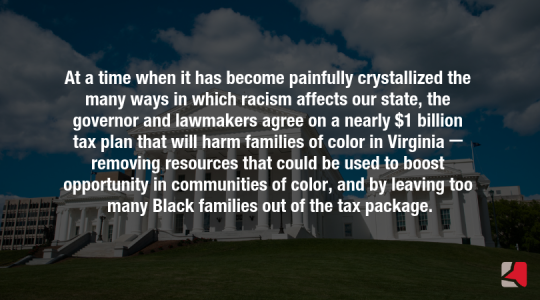February 8, 2019
Governor and Legislators Move Forward Tax Plan That Does Little to Nothing for Many Black Families
Revelations of Virginia lawmakers’ pasts have overwhelmed state and national news stories this week. The public as well as elected leaders and lawmakers have responded by denouncing racism and looking toward more fully reckoning with the racist legacies that persist in the commonwealth.
Yet at the same time, House and Senate leaders with the support of the Northam administration are advancing a tax plan that perpetuates racial inequity – one that leaves out too many of Virginia’s Black families while giving substantial tax breaks to affluent white households and big corporations.
The plan has a needed boost to the standard deduction, increasing it to $4,500 for individuals and $9,000 for married couples, and provides a nonrefundable $110 or $220 credit this fall for most tax filers. But these two provisions alone aren’t enough to boost all of Virginia’s working families and will provide nothing for Virginia’s lowest-income working families, many of whom are Black families. The plan leaves out policies that provide a targeted boost to low-income working families, such as improving the state’s Earned Income Tax Credit (EITC). This omission is to the detriment of many Black working families struggling to make ends meet on low pay.
If an increased standard deduction is not paired with a refundable EITC, the plan will not provide much tax relief to a large segment of taxpayers. For example, tax filers with incomes below $20,000 would receive less than the maximum benefit from the increased standard deduction and in many cases no benefit at all, because they owe little in state income taxes due to existing state tax provisions. Black households represent about 31 percent of Virginia’s households with income below $20,000 (compared to 19 percent of the state’s population). A refundable work credit like the EITC would go much further to directing targeted tax relief to Virginia’s Black families who are more likely to pay a higher share of their income to state and local taxes in the state than white families. Black families are more likely to be paid low wages and, because of that, make up over 30 percent of the state’s EITC filers (compared to 19 percent of the state’s population).
In addition to ignoring many of Virginia’s Black families, lawmakers are prioritizing provisions that largely benefit affluent white families: the plan largely restores the SALT deduction for homeowners with high property taxes. The main portion of this deduction requires homeownership. Discriminatory policies and practices of the past kept homeownership out of reach for Black families (and other people of color) and left Black families with less income and wealth. To this day, white families are much more likely to own a home and therefore are much more likely to benefit from this tax change than other racial groups in Virginia.
The plan also rejects an important provision to rein in tax avoidance by profitable multinational corporations with overseas profits. Corporate stocks and similar financial assets are highly concentrated among well-off white households, even more concentrated than income. The average Black and Latinx household holds very few of these assets, and so benefits very little from special tax breaks that boost corporate profits.

At a time when it has become painfully crystallized the many ways in which racism affects our state, lawmakers should demonstrate their commitment to address the harms of past and present-day discrimination that has left many Black families with fewer opportunities and lower pay. Virginia needs to move in a new direction, one that takes into account the intent and impact of our choices. And the nearly $1 billion tax plan as is will harm families of color in Virginia by removing resources that could otherwise be used to boost opportunity in communities of color and by leaving too many Black families out of the tax package. Virginia has a choice to either take steps toward racial and economic justice or leave intact the status quo. Improving the state’s EITC is a small and important step lawmakers can take toward creating an economy that works for all Virginians.
Category:
Budget & Revenue
